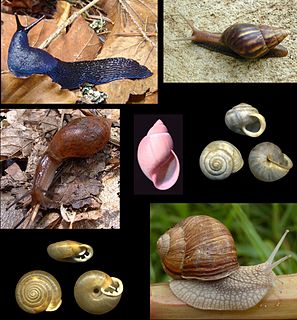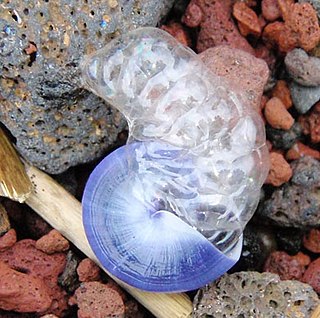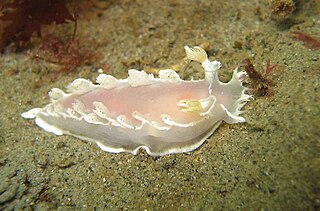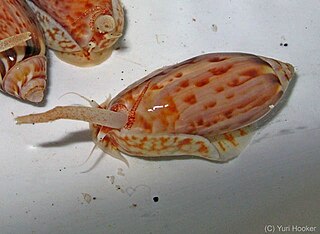Related Research Articles

The gastropods, commonly known as snails and slugs, belong to a large taxonomic class of invertebrates within the phylum Mollusca called Gastropoda.

Neogastropoda is a clade of sea snails, both freshwater and marine gastropod molluscs.

Heterobranchia, the heterobranchs, is a taxonomic clade of snails and slugs, which includes marine, aquatic and terrestrial gastropod mollusks.

Hypsogastropoda is a clade containing marine gastropods within the clade Caenogastropoda.
Volutoidea is a taxonomic superfamily of predatory sea snails, marine gastropod mollusks in the clade Neogastropoda.

Polyceroidea is a taxonomic superfamily of sea slugs, specifically dorid nudibranchs, marine gastropod mollusks in the clade Doridacea.

Pyramidelloidea is a superfamily of mostly very small sea snails, marine gastropod mollusks and micromollusks within the clade Panpulmonata.

Sigmurethra is a taxonomic category of air-breathing land snails and slugs, terrestrial pulmonate gastropod molluscs. This is an informal group which includes the majority of land snails and slugs.

Doridacea is a taxonomic grouping of dorid nudibranchs, shell-less marine gastropod mollusks. included in the clade Euctenidiacea of the clade Nudibranchia.

The Cerithioidea is a superfamily of marine, brackish water and freshwater gastropod containing more than 200 genera. The Cerithoidea are included in the clade Sorbeoconcha. The original name of this superfamily was Cerithiacea, in keeping with common superfamily endings at the time.
Nudipleura are a clade of sea snails and sea slugs, marine gastropod mollusks within the large clade Heterobranchia.

Architaenioglossa is a taxonomic group of snails which have gills and often an operculum. They are primarily land and freshwater gastropod mollusks within the clade Caenogastropoda.

The Ptenoglossa is an informal taxonomic group of sea snails. This group was considered paraphyletic or polyphyletic by Ponder and Lindberg (1997) in their classification of gastropod molluscs.

The Euctenidiacea, common name dorid nudibranchs, are a taxonomic suborder of sea snails or slugs, marine gastropod molluscs in the order Nudibranchia. Bouchet & Rocroi (2005) rejected the name Anthobranchia on the grounds that it also included Onchidium at the time of original publication. Doridina is equivalent and used in the latest classification.

The Cladobranchia are a taxonomic clade of nudibranchs, sea slugs, marine gastropod molluscs in the clade Dexiarchia.

Vanikoroidea is a superfamily of sea snails, marine gastropod molluscs in the clade Littorinimorpha. The superfamily Eulimoidea is a synonym of Vanikoroidea.

Pupilloidea is a superfamily of small and very small air-breathing land snails, terrestrial gastropod mollusks in the informal group Orthurethra.

Triphoroidea is a superfamily of minute sea snails, marine gastropod molluscs or micromolluscs within the informal group Ptenoglossa.

Olivoidea is a taxonomic superfamily of minute to medium-large predatory sea snails, marine gastropod mollusks in the clade Neogastropoda.

Freshwater snails are gastropod mollusks which live in fresh water. There are many different families. They are found throughout the world in various habitats, ranging from ephemeral pools to the largest lakes, and from small seeps and springs to major rivers. The great majority of freshwater gastropods have a shell, with very few exceptions. Some groups of snails that live in freshwater respire using gills, whereas other groups need to reach the surface to breathe air. In addition, some are amphibious and have both gills and a lung. Most feed on algae, but many are detritivores and some are filter feeders.
References
- ↑ Bouchet P. & Rocroi J.-P. (Ed.); Frýda J., Hausdorf B., Ponder W., Valdes A. & Warén A. 2005. Classification and nomenclator of gastropod families. Malacologia: International Journal of Malacology, 47(1-2). ConchBooks: Hackenheim, Germany. ISBN 3-925919-72-4. ISSN 0076-2997. 397 pp. http://www.vliz.be/Vmdcdata/imis2/ref.php?refid=78278
| This Discodorididae-related article is a stub. You can help Wikipedia by expanding it. |